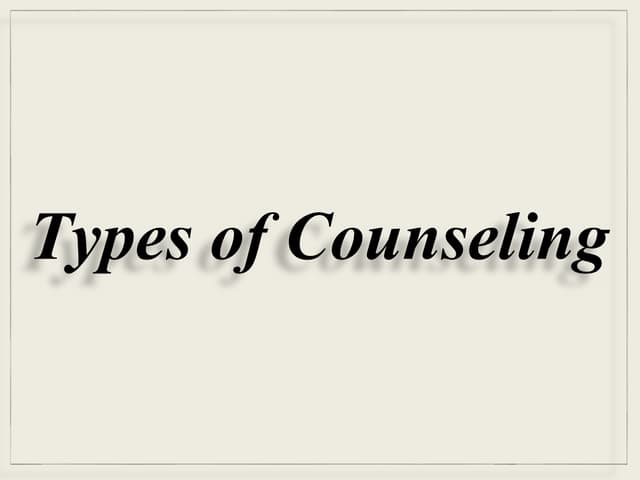adhd counselling: Key Steps for Families
A Comprehensive Overview to the Various Types of Coaching and Their Impact
Counseling incorporates a range of therapeutic techniques, each made to meet distinct psychological wellness demands. From the structured methods of Cognitive-Behavioral Treatment to the empathetic nature of Person-Centered Therapy, these techniques provide distinctive paths to individual development. Family therapy and Dialectical Behavior Therapy offer extra structures for recovery, while team therapy cultivates area assistance. Recognizing these varied methods can illuminate their profound effect on individual well-being. What remains to be checked out are the details of each method.

Understanding Cognitive-Behavioral Therapy (CBT)
Although several therapeutic techniques exist, Cognitive-Behavioral Therapy (CBT) stands apart as a result of its structured, ambitious nature. This form of treatment is based on the facility that ideas, feelings, and habits are interconnected, and by altering adverse thought patterns, people can alter their psychological responses and activities. CBT employs numerous methods, such as cognitive restructuring, which aids clients recognize and challenge altered ideas. Behavior activation motivates involvement in pleasant tasks to combat anxiety.
Typically, CBT is a short-term therapy, usually lasting in between 12 to 20 sessions, making it accessible for those seeking fast outcomes. Its effectiveness has been well-documented in dealing with anxiousness disorders, anxiety, and other mental health and wellness concerns. The specialist's role is to assist customers via workouts and research jobs, cultivating self-awareness and promoting long-term coping techniques. This functional technique empowers individuals to take control of their psychological health, ultimately resulting in enhanced life satisfaction.
Exploring Person-Centered Therapy
Person-Centered Therapy, developed by Carl Rogers, provides a different technique to Cognitive-Behavioral Treatment by highlighting the client's subjective experience. This restorative version focuses on the individual's perspective, fostering an environment of compassion, genuine positive respect, and credibility. By enabling clients to discover their feelings and thoughts without judgment, specialists assist in personal development and self-discovery.
The core tenet of Person-Centered Therapy is the belief that people possess the inherent ability for self-healing and individual development. In this setup, the specialist serves as a supportive overview rather than a directive authority, urging customers to take fee of their own trip. This technique is particularly effective for those facing problems such as low self-esteem, anxiousness, or clinical depression, as it equips them to face and understand their emotions. Ultimately, Person-Centered Treatment grows a strong therapeutic partnership, cultivating trust and visibility essential for meaningful adjustment.
The Role of Family Members Therapy in Recovery
Family therapy offers as an essential part in the healing procedure for individuals and their connections. This healing method focuses on enhancing interaction, solving conflicts, and cultivating deeper links among household participants. By dealing with useless dynamics, family members therapy urges each member to reveal their ideas and sensations in a safe setting, promoting understanding and compassion.

The impact of family check this site out treatment extends past the sessions, as improved partnerships can cause enhanced psychological wellness for all involved. Overall, household therapy plays a crucial role in healing by cultivating unity, durability, and common support among relative, eventually leading them toward a much healthier, much more meeting life together.
Unloading Dialectical Behavior Modification (DBT)
Building on the foundation of healing approaches that improve psychological wellness, Dialectical Behavior modification (DBT) offers a structured framework for individuals fighting with intense feelings and behavior challenges. Created by Marsha Linehan, DBT integrates cognitive-behavioral strategies with mindfulness practices, intending to help clients take care of frustrating feelings and enhance social effectiveness.
The treatment is particularly valuable for those diagnosed with Borderline Character Condition however is also suitable to a series of various other psychological health and wellness concerns. virtual therapy. DBT includes individual therapy sessions and abilities training teams, concentrating on 4 vital ability: mindfulness, distress resistance, emotion guideline, and interpersonal efficiency
The Benefits of Group Counselling Sessions
While specific treatment gives beneficial understandings, team therapy sessions provide distinct benefits that can considerably improve the therapeutic experience. One essential advantage is the sense of area that arises amongst individuals. Individuals typically find comfort in sharing their experiences with others encountering comparable obstacles, promoting a helpful atmosphere that decreases feelings of seclusion.
In addition, group sessions encourage diverse perspectives, allowing individuals to gain from each other's coping methods and understandings. This collective knowledge can result in boosted analytical capacities and a more comprehensive understanding of personal concerns.
Furthermore, team counseling often promotes accountability, as members motivate have a peek here each other to pursue their goals and follow their commitments. Ultimately, the cost-effectiveness of group treatment makes it an available alternative for numerous people seeking assistance. Overall, the collective nature of group counseling sessions can substantially enhance the therapeutic journey.
Regularly Asked Inquiries
What Qualifications Do Specialists Need to Exercise Therapy?
Therapists typically need a relevant degree in psychology or therapy, together with monitored clinical experience. Furthermore, they must get suitable licensure or accreditation to exercise lawfully, ensuring adherence to specialist criteria and ethical standards.
Exactly how Do I Choose the Right Kind of Therapy for Me?
Choosing the best kind of treatment entails assessing personal requirements, discovering various techniques, taking into consideration therapist specialties, and looking for navigate to this website recommendations. Comprehending private objectives and choices can substantially enhance the effectiveness and contentment of the healing experience.

Are Online Therapy Sessions as Effective as In-Person Ones?
The performance of on the internet counseling sessions contrasted to in-person ones typically depends on individual choices and situations. Study suggests that both approaches can produce positive end results, though some may locate greater convenience in face-to-face interactions.
How Much Time Does Therapy Generally Last?

What Should I Expect During My First Counseling Session?
During the very first counseling session, clients can expect an introduction, discussion of their concerns, establishment of objectives, and an introduction of the therapy process - virtual therapy. This first meeting aims to develop rapport and warranty comfort